Amos. 7:12-15; Ps. 85:9-14; Eph. 1:3-14; Mk. 6:7-13
To preach repentance! Want to be a prophet, don’t expect a “welcome” mat. Amos was sent packing home, John the Baptist was beheaded and Christ was crucified for being prophets. We are call called to be prophets by our baptism to preach repentance. Jesus sent out his disciples two by two to preach repentance taking nothing for the journey except faith and hope. Repentance (metanoia) is a turning away from sin and returning to a relationship with God. Repentance is the first step to salvation. In repentance it is not about the universal “me”, my regrets, my fears, my needs but about him and our surrendering to him to respond to his calling and receive the grace of redemption. Healed by his body and blood Jesus saves. Repentance includes the four elements of responsibility, regret, resolve, and repair (Dr. Laura Schlessinger, NYT 05/10/98).
Taking responsibility is more than feeling “sorry”. When a child says “I’m sorry” it comes from being caught in a wrong more than understanding the wrong. Responsibility comes with understanding the wrong our act has caused on another. When we sin against God, do we understand the wrong our act has caused God? If we sin against our neighbor, we may see the harm it has caused them but we don’t always understand the harm we cause God. Sin harms our relationship with God because the injury is to the heart of love. Sin is a rejection of love itself from God. By divine will we are all created in the image of God and we harm the love of God for his people. It is as simple as if someone causes harm to your child then you yourself are harmed not just the child. We are all children of our heavenly Father.
Once we come to take ownership of our responsibility for having sinned, we experience regret meaning that we come to an awareness that changes how we think about ourselves, our actions, our relationship with others and with God. With regret we enter into the heart of love for the injury caused, remorseful and willing to begin the process of healing that love by an interior change. If nothing changes in us then our regret is not about love of other but remains simply a self-centered love. This is a key element of repentance when we answer the question “what will be different” about me, my actions, my love for God. True regret is an act of change for the better. God calls us to be perfect, a perfection that comes from our unconditional surrender to him. Regret is one step further away from our sin and a step closer to perfection with a change for the better.
With regret we are empowered with a resolve to be the best God created us to be. We receive the fire of the Holy Spirit directing us to where God is calling us. This resolve is a willingness to surrender ourselves to God with greater trust out of love. Our obedience to God is the fear of separation from God after experiencing the darkness of our own sin and the grace of forgiveness. Because of the darkness of sin, we may not yet know how good it is to be walking in the light of grace but we do know the consequences of having allowed sin into our hearts and seen the impact to our relationships with others. It is a past we don’t want to relive and a path we don’t want to continue. With resolve we make a decision to follow a new path by beginning to seek God’s answer and our calling. We pray for his revelation and we take the next right step in faith and hope. This was the resolve of the disciples surrendering themselves to the will of God.
We then ask ourselves “what can I do to repair the relationship”? For Catholics repair begins with going to confession. If we are to heal our relationships with each other we need to return to God and receive his forgiveness to be guided to right action with others. We pray for those who we have hurt and when possible, we ask for forgiveness and seek to make amends with those affected by our behavior. We expect more from ourselves than from others allowing others to heal on their time not ours. Too often we want others to forgive and forget but injury takes time to heal. Broken trust is more than a broken bone. Trust goes to the soul of a person. If frustrated because someone keeps bringing up the past recognize the pain behind the broken trust and pray for their healing. Reconciliation takes three the sinner, the wounded, and the reconciler who is God. With God and in God we become one again with each other.
The disciples were sent to preach the message of repentance but we also see in the first reading Amos a shepherd also was sent to prophesy to his people. By our baptism we are also sent to prophesy a message of repentance and forgiveness. Of course, we cannot offer what we do not ourselves live so it must begin with us. Who do we need to forgive from our past or even from today? Repentance and forgiveness work together for reconciliation to heal the wounded heart. We must repent ourselves as penitents seeking God’s mercy. Mercy opens up our hearts of rebelliousness to forgive others as we are forgiven. Jesus is ready with his mercy to forgive us to heal his own wounded heart by our transgressions. We have but only to come and seek his mercy.
No one lives without suffering. We are called to pick up our cross and live through the passion of Jesus. We live through our agony by going to our prayer garden. Our prayer garden is the interior room where we enter into peaceful dialogue with God. We live through our scourging when suffering is beyond our control offering it up as a sacrifice of love. We live through our crowning with thorns as others criticize and judge us but we do not respond in like manner. We live through the carrying of our cross for living through the things we cannot change and we die to ourselves to allow God to reign in us. This was the journey Jesus sent his disciples out to live in preaching repentance to a rebellious people. This is part of the journey of life and salvation.
Some of the disciples carried the red robe of martyrdom. Others lived the white robe of martyrdom. In the image of Divine Mercy, we see both the red rays of martyrdom and the white rays of martyrdom coming out of the side of Jesus. For us today, we are to live the white robe of our daily sacrifice. God the Father has blessed us in “Christ with all the spiritual blessings in the heavens…to be holy and without blemish before him”. When the world speaks of microaggressions let us speak of micro-martyrdom in living all the little sacrifices of life for the greater good. Repentance leads us to holiness without the blemish of sin to be perfect as we are called to be. Spiritual blessings build up the kingdom of God with every act of love.
If the promised gift of the Holy Spirit is the “first installment of our inheritance toward redemption” what greater glory is yet to come. We are being redeemed that is bought back by the blood of the lamb to share in his glory what eyes have not seen. Imagine our inheritance of peace, justice, and joy free from the burden of sin, sickness, and sorrow. Imagine the glory of the resurrected body not limited by time, space, or matter. Imagine the beatific vision of being in the presence of God the Father, Jesus the Son, the Holy Spirit, Blessed Mother Mary, all the angels and saints and reunited to our loved ones. The sting of death removed and the glory of heaven revealed.
Now consider one who we would want to be in heaven with us, a parent, child, spouse, friend and finding out they are separated from us by the stain of sin suffering in purgatory waiting for prayers of consolation. Imagine if it is us who are the one waiting for those prayers, an offering of a Mass intention, enduring the justice of God for not having answered the call to holiness in this life. Imagine the hopeless lost from heaven who we knew and had an opportunity to share the good news of repentance and salvation but we remained silent.
Recall it is not always about what we have done but also what we have failed to do as the words of scripture remind us in Mathew 25:44-46 “Lord, when did we see you hungry or thirsty, or a stranger or naked or ill or in prison, and not minister to your needs? He will answer them ‘Amen, I say to you, what you did not do for one of these least ones, you did not do for me’ And these will go off to eternal punishment, but the righteous to eternal life”. Who is ready to claim “righteousness” before the Lord? Praise God for the sacrament of confession that we can make this day a new beginning and be washed clean. When was your last confession? Well maybe its time again, nothing like the present to renew ourselves in the body and blood of Jesus and wash our baptismal robes ready to receive our Lord and savior.
Let us go out to “preach repentance” by beginning with an act of contrition ourselves when we pray, “Lord God, in your goodness have mercy on us: do not look on our sins, but take away all our guilt. Create in us a clean heart and renew within us an upright spirit.” With God’s help we do what is possible so he can work the impossible in our lives.
Tags















Recent Comments